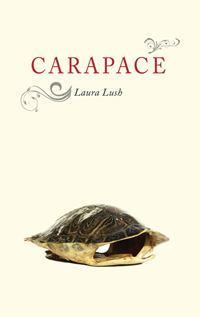Reviews
Poetry Review by Christopher Levenson
Laura Lush, Carapace (Kingsville: Palimpsest, 2013). Paperbound, 88 pp., $18.
At a time when the gaudy pyrotechnics of slam and the gimmickry of erasure poetry hold sway, it is doubly refreshing to come upon Laura Lush’s fourth book. Her themes juxtapose the protagonist’s remembering and grieving a dead father with a moving sequence evoking the process of gestation and giving birth to her first child. In the third section, this gives way to confrontations not just with the randomness of violence and death in the human and the wider natural world (such as the protagonist’s eighty-year-old father’s killing of a raccoon that had invaded their kitchen at night, in order to protect his children), but also with the exhilaration of sudden beauty, watching kites flying above a beach or seeing a whale breach. The concluding section offers short, often witty or quirkily humorous poems mainly occasioned by birds, beasts, and flora.
However, it is not her themes but rather what she refers to as “the mind‘s footwork,” the little linguistic gestures that reveal the consummate poet and make this book distinctive. Lush’s language is unobtrusively condensed. Thus, in “Five Thirty,” evoking an early-morning feeding of her new baby, she writes: “He wants milk, warmth— / The clench of my arms around him.” (My italics are used here, throughout.) This emotional realism, the ambivalence that hints at anger or irritation, resurfaces more directly a few lines later, though paired with a willingness to bend syntax to her purposes:
One day he will hate me. Just because I made
him the way of all boys. Tough and splendour
in his grit for life. He will also love me, but
a little less than now. Now is survival, the want
of my protection.
Constantly we find a willingness—akin to what Gerard Manley Hopkins does in, say, “The achieveof, the mastery of / The thing” in “The Windhover”—to prune parts of speech for added impact, as in “The Beach,” where a kite “Flaps in tatters as children run / behind it, certain of lift and wind-surge, of again,” or, in “Bonespot,” “Coming up quick—a moment’s sly—a whale / surfacing.” She is likewise happy to invent verbs: “until boredom unstalls” or, again, “So the tree. And the wrongful / way the wind unleaved it.” Such deviations from normal usage are so much part of the poem, they barely register as unusual. Indeed, since Lush’s concern is less to be spectacular than to convey accurate, quietly observed moments, mostly in domestic life, much in this poetry happens almost subliminally, as in “March,” by a series of vigorous, small strokes, quick allusive phrases, sharp visual images:
Underneath, grasses move—small itches swaying like Sargasso.
Jackdaws swoop and thieve what they can. Beaks like the long
curved nails of a sarcophagus’ mummy. Light, then no light.
All the shine turned in. Sun coppered into the hard brown earth.
However acute, the free play of her imagination does not seem self-consciously clever or whimsical. Her poem, “Small Story” advises us to “savour the small moments.” That is indeed what Lush, time and again, manages to do with these poems. Thanks to their honed quality, where nothing seems excessive, everything centripetal, they grow upon the reader, sink in, strike roots.
—Christopher Levenson









